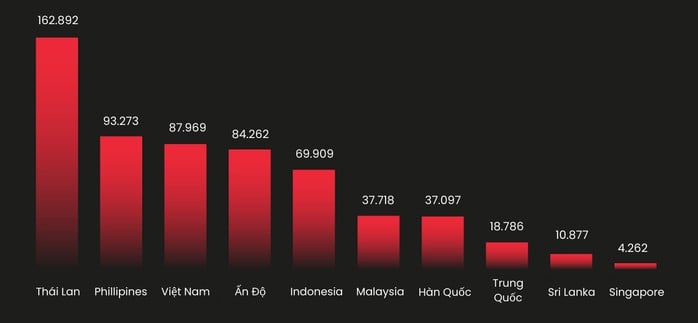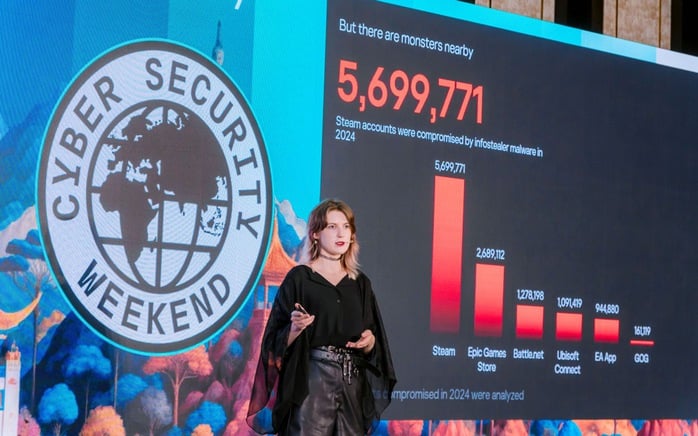Of these, Steam accounts for 5.7 million accounts, while major systems such as Epic Games Store, Battle.net, Ubisoft Connect, GOG and EA combined account for about 6.2 million. The attacks mainly originate from infostealer malware.

Number of Steam accounts hacked in 2024. Source: Kaspersky Digital Footprint Intelligence
From the malware log data, Kaspersky analyzed the number of Steam accounts exposed in the Asia- Pacific region. The results showed that Thailand leads with nearly 163,000 accounts, followed by the Philippines with 93,000 and Vietnam ranked third with nearly 88,000. On the other hand, Singapore recorded only 4,000 accounts, the lowest in the region.
It’s no surprise that APAC has become a prime target: the region is now the global gaming hub, home to more than half of the world’s gamers, at nearly 1.8 billion people. The boom in mobile devices, the growth of both casual gaming and eSports, has made it a breeding ground for cybercriminals.
Polina Tretyak, a researcher at Kaspersky Digital Footprint Intelligence, said that data breaches are often made public months or years after the attack, which means the actual number of compromised accounts could be much higher. She recommended users change their passwords regularly, avoid using the same password across multiple platforms, and run security scans if they suspect they may have been infected with malware.

Ms. Polina Tretyak, Researcher at Kaspersky Digital Footprint Intelligence
Not only gamers, businesses also face risks when employees use corporate email to sign up for personal services. Research from Kaspersky shows that 7% of leaked accounts on Netflix, Roblox, Discord are linked to corporate email. This opens up the risk of hackers using leaked information to trick employees into installing malware on the system, cracking passwords or illegally accessing important data.
Infostealers, often disguised as pirated games, cheats, or unofficial mods, aim to steal passwords, cryptocurrency wallets, credit cards, and browser cookies. The data is then sold on the darknet, fueling further attacks. This threat is especially acute in hybrid work and BYOD (bring your own device) environments, where the lines between personal and professional use are increasingly blurred, creating opportunities for malware to spread.
To avoid becoming a victim, Kaspersky experts recommend several measures:
+ For individuals: Run a comprehensive security scan on all devices to remove any detected malware; Change passwords of compromised accounts; Monitor for suspicious activities related to affected accounts.
+ For businesses: Proactively monitor dark web forums to detect early customer or employee accounts with exposed information; Use specialized solutions such as Kaspersky Digital Footprint Intelligence to understand what cybercriminals know about company assets, thereby identifying potential attack methods and deploying timely protection measures.
Source: https://nld.com.vn/hon-11-trieu-tai-khoan-game-bi-ro-ri-thong-tin-dang-nhap-19625090417305553.htm






![[Photo] Cutting hills to make way for people to travel on route 14E that suffered landslides](https://vphoto.vietnam.vn/thumb/1200x675/vietnam/resource/IMAGE/2025/11/08/1762599969318_ndo_br_thiet-ke-chua-co-ten-2025-11-08t154639923-png.webp)


































![[Video] Hue Monuments reopen to welcome visitors](https://vphoto.vietnam.vn/thumb/402x226/vietnam/resource/IMAGE/2025/11/05/1762301089171_dung01-05-43-09still013-jpg.webp)





































































Comment (0)